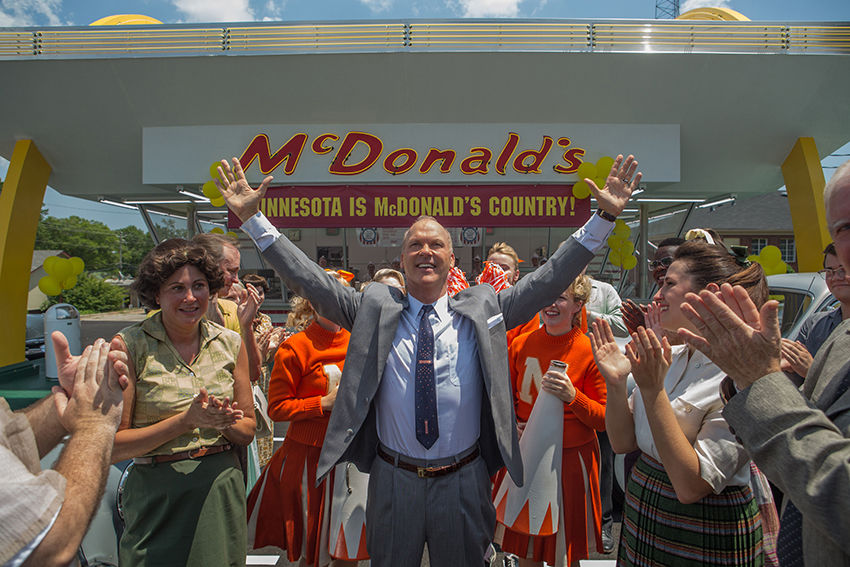Nearly everyone in America has eaten at a McDonald’s restaurant at least once, because the world’s largest restaurant chain has well over 14,000 locations in the U.S. alone and nearly 35,000 worldwide. A man named Ray Kroc usually gets recognized as the founder of McDonalds, since he was the head of the corporation for decades until his death in 1984 and oversaw its massive worldwide expansion.
But few people remember that the fast-food giant was originally conceived as a single location in San Bernardino by two brothers, Richard and Maurice McDonald. The new movie “The Founder,” starring Michael Keaton as Kroc, tells the story of how Kroc took the humble family-owned business to worldwide domination while leaving the McDonald brothers largely forgotten by history.
The result is a movie that offers a family-friendly look at an intriguing slice of American history. Its director, John Lee Hancock, has a long history of creating true-life tales that anyone can enjoy without offense, ranging from “The Rookie” and “Saving Mr. Banks” to the massive 2009 blockbuster “The Blind Side,” for which its star Sandra Bullock won the Best Actress Oscar.
The film’s director, John Lee Hancock, and Keaton took some time to discuss “The Founder” with the Angelus, as well as the Christian upbringing that guides Hancock’s career choices.
“It was a script that crossed my desk, and I really enjoyed it because I’d never read a script like it before,” said Hancock. “Because at the beginning I was rooting for Ray Kroc, then as it goes on I was kind of hesitant about what he was doing, and, by the end, I felt almost oily and complicit in his rise. I thought this was a tricky one to pull off, but I’d like to give it a shot because I’d like it to be a Rorschach test for viewers.”
The movie is set largely in a seven-year period of the 1950s, as Kroc — who was a struggling milkshake-machine salesman — decides to drive from the Midwest to California and meet the McDonald brothers after they place the largest order he’s ever sold. It’s a case of wanting to see it to believe it, and he soon realizes that the brothers have created a streamlined process for service that is able to serve people at a rapid pace that can revolutionize the food industry.
Kroc hatches a plan to franchise the restaurant, but the brothers start to worry that he’s sacrificing the quality of the food and customer service in the name of greed and overarching ambition. The resulting clash is a fascinating and touching story that gives viewers plenty to consider about what is moral and ethical in how to conduct business.
“The title is intentionally misleading: what’s your personal definition of founder, the person who has the idea or grows the idea?” asked Hancock, a Texas native who has an actual milkshake machine from the original McDonald’s in his Pasadena office. “It plays with that notion a lot — who gets credit and who takes credit? It’s about the American Dream and capitalism and how that’s changed. I think the McDonald brothers’ idea of capitalism was to have the best idea and work the hardest. Ray’s version was someone else can have the idea, you just need investment bankers, and that works as well.”
“It’s not just a hamburger or food,” added Keaton during an interview at the London Hotel in West Hollywood. “McDonalds was the biggest shift in popular culture and fast food that there will ever be. It wasn’t just about a hamburger. It’s where America was at the time and how it changed everything.”
Hancock, 60, was born in Longview, Texas, and grew up in Texas City — on the Gulf of Mexico coast, 35 miles outside of Houston. He earned an English degree at the Christian college Baylor University before initially becoming a lawyer.
But the passion for movies that he developed in college inspired him to write short stories and plays, and at the age of 27 he quit his law firm and moved to Los Angeles to pursue a TV and film writing career. His first produced screenplay was “A Perfect World,” a 1993 movie that starred Kevin Costner and Clint Eastwood (who also directed). His career has been fueled by the personal moral values he’s held throughout his life.
Aside from the strong Christian angle of “The Blind Side,” Hancock’s good taste is also evident in the fact that “The Founder” tells its story with almost no foul language. But even more noteworthy is the fact that his 2001 hit “The Rookie,” which told the true story of a man named Jim Morris who became a major-league baseball pitcher at age 40, was rated G despite being a story aimed primarily at adults.
“The way you grow up and your personal mores come into play in your life, your personal life, things like that,” said Hancock. “With ‘Blind Side’ I never set out to make a movie geared towards the faith-based community. It was surprising when the faith-based community embraced it because Leigh Anne Tuohy drank alcohol and swore. But I think they liked that finally someone portrayed Christians as real people.”
That ability to tell a classic story in classy fashion is a hallmark of Hancock’s films, and “The Founder” carries on that tradition. In telling a story of a complex man who achieved great successes but did so amid moral conflicts, it’s a reflection of all our fallen and struggling natures.
“There were two boring movies you could make from this,” said Hancock. “One would be Ray Kroc as hero, with the better idea, who wins in the end and we’re cheering. And the other would be, it’s a Ray Kroc takedown. But neither one is true. He’s a complicated guy and he’s a hardworking guy. There are a lot of things about Ray Kroc I admire greatly, but others not so much.”

